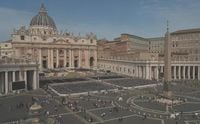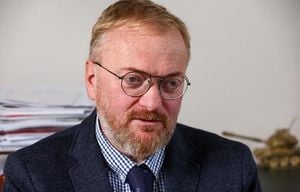Pope Francis, the head of the Roman Catholic Church, has passed away at the age of 88, according to a statement released by the Vatican. The announcement was made on Monday, April 21, 2025, at 7:35 a.m. by Cardinal Kevin Farrell, who expressed deep sadness over the loss of the pontiff. "Dear brothers and sisters, with deep sadness I must announce the passing of our Holy Father Francis. This morning at 7:35 a.m., Francis, Bishop of Rome, returned to the house of the Father," Farrell stated in a video message.
Pope Francis, born Jorge Mario Bergoglio, was elected to the papacy on March 13, 2013, making history as the first Argentine and first Jesuit to lead the Catholic Church. His election came as a surprise to many who considered him an outsider, known for his commitment to the poor and marginalized.
Recently, Pope Francis had been battling health issues, having suffered from double pneumonia that required a 38-day hospitalization. He was discharged on March 23, 2025, and made a public appearance during Easter celebrations, greeting the faithful from the balcony of St. Peter's Basilica.
During his papacy, Pope Francis was known for implementing significant reforms within the Catholic Church. His leadership saw a push towards inclusivity, including a revised Vatican constitution that allowed any baptized Catholic, including women, to lead various departments within the Church's central administration. This move was seen as a progressive step, although it faced criticism from more conservative factions within the Church.
In addition to administrative reforms, Pope Francis advocated for greater acceptance of the LGBTQ+ community, a stance that drew ire from traditionalists. His calls for the Church to be more open and welcoming were part of a broader effort to modernize the Catholic Church and address contemporary social issues.
One of the defining moments of Pope Francis's papacy was his response to the sexual abuse crisis that has plagued the Church for decades. In February 2019, he convened a summit with around 200 church leaders to address the issue of sexual abuse of minors by clergy. That same year, he enacted a law requiring all clergy to report any known cases of abuse, abolishing the so-called "papal secret" regarding abuse cases. Despite these measures, advocacy groups expressed disappointment, stating that the actions taken were insufficient and came too late.
Pope Francis's tenure was also marked by financial scandals that tarnished the Church's reputation. In 2020, Cardinal Angelo Becciu resigned amid a real estate scandal, and in 2023, he was convicted of embezzlement and corruption, receiving a five-and-a-half-year prison sentence.
Throughout his papacy, Pope Francis addressed various global issues, including the COVID-19 pandemic. He promoted vaccination campaigns and condemned misinformation surrounding vaccines, labeling the care for health as a moral duty.
His approach to geopolitical issues, particularly the ongoing conflict in Ukraine, drew mixed reactions. Since the onset of Russia's full-scale invasion in 2022, Pope Francis faced criticism for not explicitly condemning Russia's actions. In a November 2023 interview, he acknowledged the suffering of the Ukrainian people, referring to them as a "martyr people" while also expressing concern for the need to avoid direct condemnation that could lead to further conflict.
In his last Easter message, he prayed for a "just and lasting" peace for Ukraine and urged all parties involved to continue working towards a resolution. However, his call for Ukraine to "find the courage to raise the white flag" was met with backlash, as many interpreted it as a call for surrender.
World leaders have expressed their condolences following the death of Pope Francis. French President Emmanuel Macron stated, "Pope Francis wanted the Church to bring joy and hope to the poorest. That it would unite people with each other and with nature. We express our condolences to all Catholics and the grieving world."
In the coming weeks, a conclave of cardinals will convene to elect a new Pope. Until then, Cardinal Kevin Farrell will oversee the Church's affairs as Camerlengo. The legacy of Pope Francis is one of significant change and controversy, as he sought to navigate the complexities of modern society while remaining true to the core values of the Catholic faith.
Pope Francis's journey from the streets of Buenos Aires to the Vatican was marked by a commitment to serving the marginalized and advocating for social justice. His life and work have left an indelible mark on the Catholic Church, and his passing marks the end of a transformative era.




